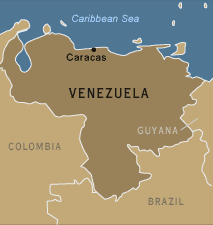1. Constitutional History
Venezuela has been governed by several different constitutions over the years, but the most recent version was drafted in 1999. The new constitution is the 26th in Venezuela’s history.
2. Type of Government
Venezuela is a federal republic. The president, Hugo Chávez Frias serves both as chief of state and head of government; the unicameral National Assembly is composed of 165 members elected by popular vote to serve five-year terms; the high court is comprised of magistrates elected by the National Assembly for a single 12-year term.
3. Process for Drafting and Ratification
A 131-member body of elected officials made up the constitutional assembly, which drafted the 1999 constitution. The people of Venezuela voted by a 92 percent majority to ratify the new constitution in December 1999.
4. Assistance From International Agencies
There were no agencies of note assisting Venezuela in the construction of its constitution.
Venezuela’s political history has been wracked by violence, upheaval, and crippling corruption. When current President Hugo Chávez was first elected in December 1998 he enjoyed an 80 percent approval rating. In the nearly six years since he’s been in office, his numbers have dipped somewhat, but in general Chávez is an extremely popular, if controversial leader. The source of his popularity comes at least in part from the fact that he has followed through with his campaign promises to rid Venezuela of social and political instability, uplift its poor, and eradicate corruption from it’s judicial system. The source of his divisiveness centers around the means he’s employed to accomplish these goals, including, in particular, a significant re-drafting of the country’s constitution which opponents say has placed Chávez in an unprecedented position of political power.
Indeed, the new constitution does give Chávez much more control than his predecessors. It extends his presidential term from five to six years and allows for re-election for one consecutive term, a provision that did not exist before. It also does away with aspects of the government, such as the bicameral congress, which were previously controlled by his opponents. Nonetheless, Chávez has just overcome the most recent attempt to unseat him — a mid-term referendum on his presidency was defeated by 58 percent of the vote in August of this year.
- Previous: Afghanistan
- Next: South Africa



